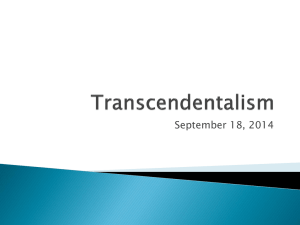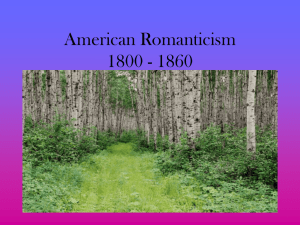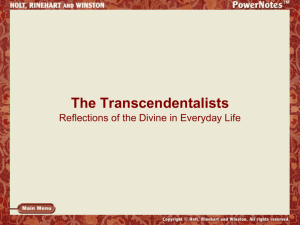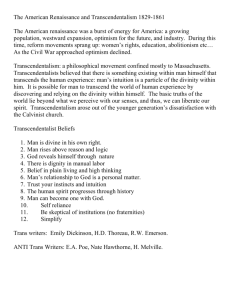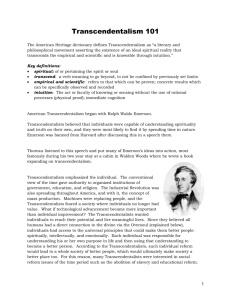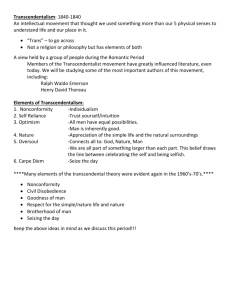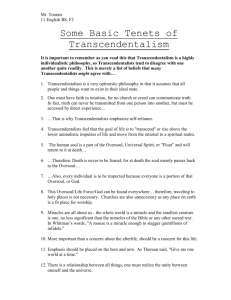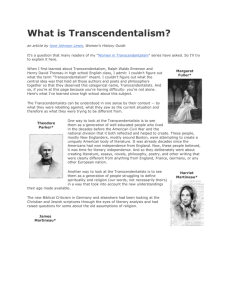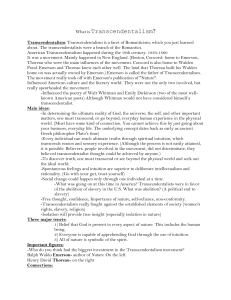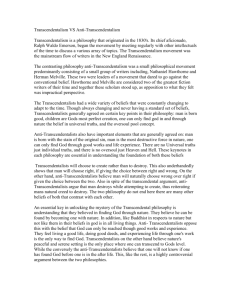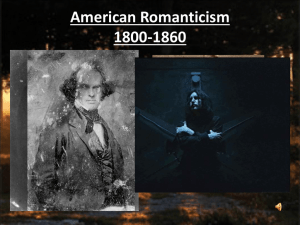Collection 2 Notes I. What was Transcendentalism?
advertisement
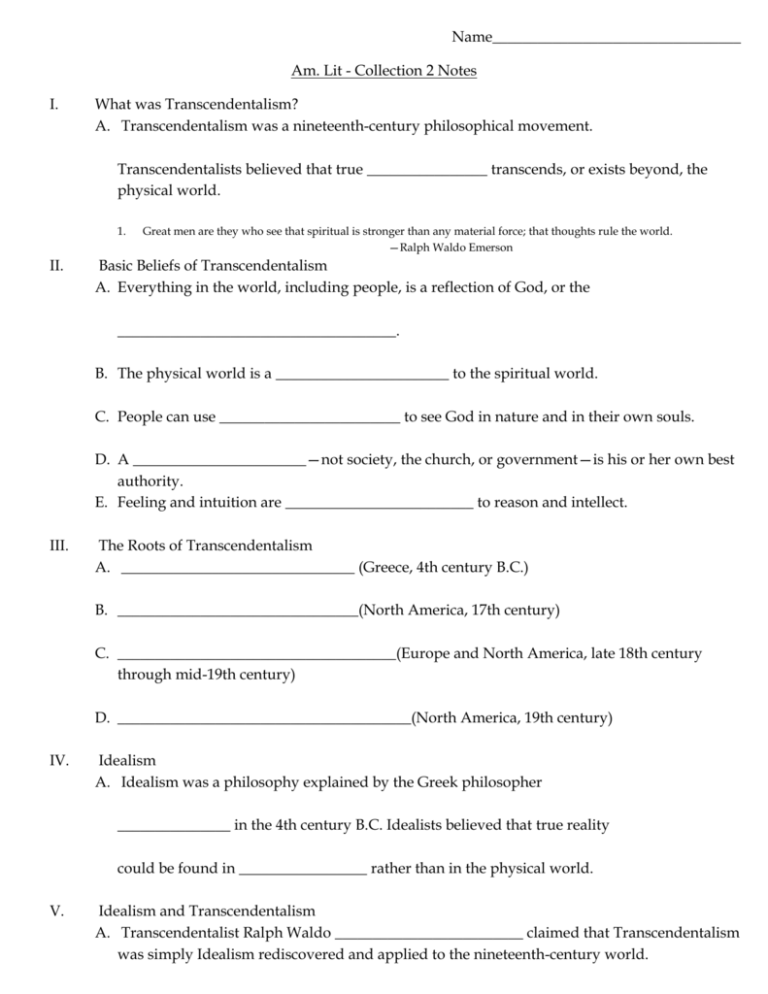
Name_________________________________ Am. Lit - Collection 2 Notes I. What was Transcendentalism? A. Transcendentalism was a nineteenth-century philosophical movement. Transcendentalists believed that true ________________ transcends, or exists beyond, the physical world. 1. II. Great men are they who see that spiritual is stronger than any material force; that thoughts rule the world. —Ralph Waldo Emerson Basic Beliefs of Transcendentalism A. Everything in the world, including people, is a reflection of God, or the _____________________________________. B. The physical world is a _______________________ to the spiritual world. C. People can use ________________________ to see God in nature and in their own souls. D. A _______________________—not society, the church, or government—is his or her own best authority. E. Feeling and intuition are _________________________ to reason and intellect. III. The Roots of Transcendentalism A. _______________________________ (Greece, 4th century B.C.) B. ________________________________(North America, 17th century) C. _____________________________________(Europe and North America, late 18th century through mid-19th century) D. _______________________________________(North America, 19th century) IV. Idealism A. Idealism was a philosophy explained by the Greek philosopher _______________ in the 4th century B.C. Idealists believed that true reality could be found in _________________ rather than in the physical world. V. Idealism and Transcendentalism A. Transcendentalist Ralph Waldo _________________________ claimed that Transcendentalism was simply Idealism rediscovered and applied to the nineteenth-century world. 1. Transcendentalists shared Plato’s belief in an all-encompassing _______________________ reality. 2. They applied Idealist ideas to human life, believing in human ______________________________ and working to achieve that goal. VI. Puritanism A. Puritanism was an early American _________________________ philosophy. The Puritans believed that 1. religion is a _______________________, inner experience that should not be filtered through clergy or government 2. people should be _________________________________ 3. God’s presence reveals itself primarily through the _________________, but also through signs in the physical world VII. 4. human salvation is reserved for a few _________________people—the majority of humanity is destined to damnation Puritanism and Transcendentalism A. Transcendentalists shared the Puritan beliefs in the personal ____________________ of religion and the desirability of self-reliance. B. However, Transcendentalists differed because they 1. looked to nature, not the Bible, as a _______________________ source of divine revelation 2. believed that __________ humans, not just the “elect,” were connected to a divine source VIII. Romanticism A. Romanticism was a school of thought that began in late eighteenth-century Europe and spread to America in the nineteenth century. The Romantics 1. valued ____________________________ feeling, and nature over reason, logic, and civilization 2. championed _______________________________ IX. 3. reflected on ______________________ to gain spiritual wisdom Romanticism and Transcendentalism A. Transcendentalism was one of the faces of American Romanticism. 1. Transcendentalists took the Romantic belief that spiritual wisdom could be found in nature one step further—they believed that everything in the physical world, including human beings, is a reflection of _____________. 2. The Transcendentalists believed that because human beings are a part of the Divine Soul, they are capable of __________________. X. Belief in Action A. Because Transcendentalists believed in the possibility of human perfection, they 1. pursued ________________________ goals for improving people’s lives 2. developed plans for creating a perfect, or _____________________, society 3. worked for ________________________ change XI. Ralph Waldo Emerson A. Emerson was the best-known ________________________________. He 1. was a highly influential __________________, lecturer, and social reformer 2. ___________________________ and wrote extensively on Transcendental ideas 3. was _______________________ by and influenced other writers and artists, including Henry David Thoreau and Walt Whitman XII. Emerson’s Optimism A. ______________________, or positive thinking, was an important part of Emerson’s transcendentalist view. He believed that 1. because God is good, all natural events and experiences, even ___________________and disaster, can be explained on a spiritual level 2. we can know God directly through the power of our ___________________________ 3. by _______________________our own power to know God directly, we will see that we, too, are a part of the Divine Soul XIII. Who Were the Dark Romantics? A. The Dark Romantics were a group of nineteenth-century writers who explored the ________________side of human nature. B. Dark Romantic writers explored the human potential for evil, including the psychological effects of guilt, ______________, and madness. C. The Dark Romantic view __________________________ the optimism of the Transcendentalist writers of the time. “I know not how it was—but, with the first glimpse of the building, a sense of insufferable gloom pervaded my spirit. I say insufferable; for the feeling was unrelieved by any of that half-pleasurable, because poetic, sentiment, with which the mind usually receives even the sternest natural images of the desolate or terrible.” From “The Fall of the House of Usher” by Edgar Allan Poe XIV. Differences Between Transcendentalists and Dark Romantics Transcendentalists Saw divine goodness and beauty beneath everyday reality Embraced the mystical and idealistic elements of Puritan thought Dark Romantics Believed spiritual truths may be ugly or frightening Reintroduced the dark side of Puritan beliefs: the idea of Original Sin and the human potential for evil XV. Similarities Between Transcendentalists and Dark Romantics A. ________________ reality is spiritual. B. Intuition is superior to_____________ or reason. C. Human events contain signs and symbols of spiritual _________________. XVI. Nathaniel Hawthorne (1804-1864) A. Hawthorne’s short stories and novels reflect Dark Romantic views of humanity. 1. In _________________________________________________, four people drink a magical elixir and choose the foolishness of false youth over the wisdom of age and experience. 2. In _______________________________________, a Puritan minister decides to wear a black veil for the rest of his life to represent the universality of sorrow and secret sin. 3. The novel ________________________________________ tells a story of sin and redemption and explores the evil of hypocrisy. XVII. Edgar Allan Poe (1809-1849) A. Poe’s masterful short stories told tales of madness, revenge, and tragic fate. 1. In ____________________________________________, the mad narrator takes deadly revenge on a man who insulted him. 2. In the classic horror tale ______________________________________, the narrator barely escapes a horrible death in a dark dungeon. 3. In _________________________________, a man commits murder and is driven to confess by the imaginary beating of the dead man’s heart. XVIII. The Dark Romantic Legacy A. Dark Romantic themes still appear in stories, books, movies, TV shows, and comic books. 1. Present-day horror stories and movies borrow images and themes from the original master of horror, _______________________________. 2. The ________________________between good and evil and the effects of guilt and sin are major themes in current literature, popular writing, and television.
